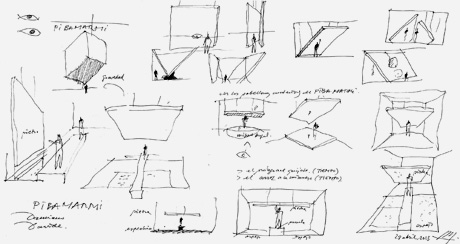Alberto Campo Baeza
The image of the massive boulder burdening Sisyphus’ existence was an inspiration for Alberto Campo Baeza to work on the concept of gravity; the reference to the Greek myth is at the base of the recent project by the Spanish architect for Pibamarmi pavilion at the 2013 edition of Marmomacc. The setting aims to stress once again the importance given by Campo Baeza to the force of gravity as architectural main theme: an enormous stone plate will hang over visitors’ heads turning from incumbent presence to “mysterious and provocative” entity, fluctuant among walls made of white silk and duplicated in the image of a completely reflective floor. The pavilion will consist of a semi-cubic room to be perceived as a perfect 8-metre-long cube – an unusual shape for the exhibition context – thanks to the horizontal mirror, in a refined balance between real building and illusionistic effect. The idea of the mirror is for Campo Baeza the materialization of fugacity and will underline yet another fundamental concept for architecture, the recognition of time. In the middle of the exhibition space, a path made of white marble staves and surrounded by Pibamarmi design elements, horizontally and vertically reflected, will lead to the room devoted to meetings and company communication. Reaffirming the projecting approach of 2009 La Idea Construida pavilion, created for the same exhibition in Verona, Alberto Campo Baeza is to give us another speculation on the timeless values of architecture.

Sketches by Alberto Campo Baeza for the 2013 Marmomacc pavilion The Stone of Sisyphus
Gravity
«The building blocks of poetry or music are not heavy, but those of architecture are inexorably subjected to the laws of gravity. Gravity builds space. Therefore, when I speak of the structure, I want to underline that the importance of structure lies not merely in its bearing of loads, but also in something much more important, namely in establishing the order of the space».
Mirror
«The mirror is a product of man’s astonishing inventiveness. Can you imagine the envy that Narcicssus, who spent so much time contemplating his reflection in a lake, would feel for the inventor of the first mirror? Current technology makes it possible for mirrors to be perfect and lasting. Likewise cement, which is also perfectly controllable. Cement is the materialization of permanence, of eternity. The mirror is the materialization of nothingness, of fugacity. Tempus fugit»*.
by Davide Turrini
Note
*Quotations are taken from: Alberto Campo Baeza, Principia architectonica, Madrid, Mairea Libros, 2013, pp. 17/88.